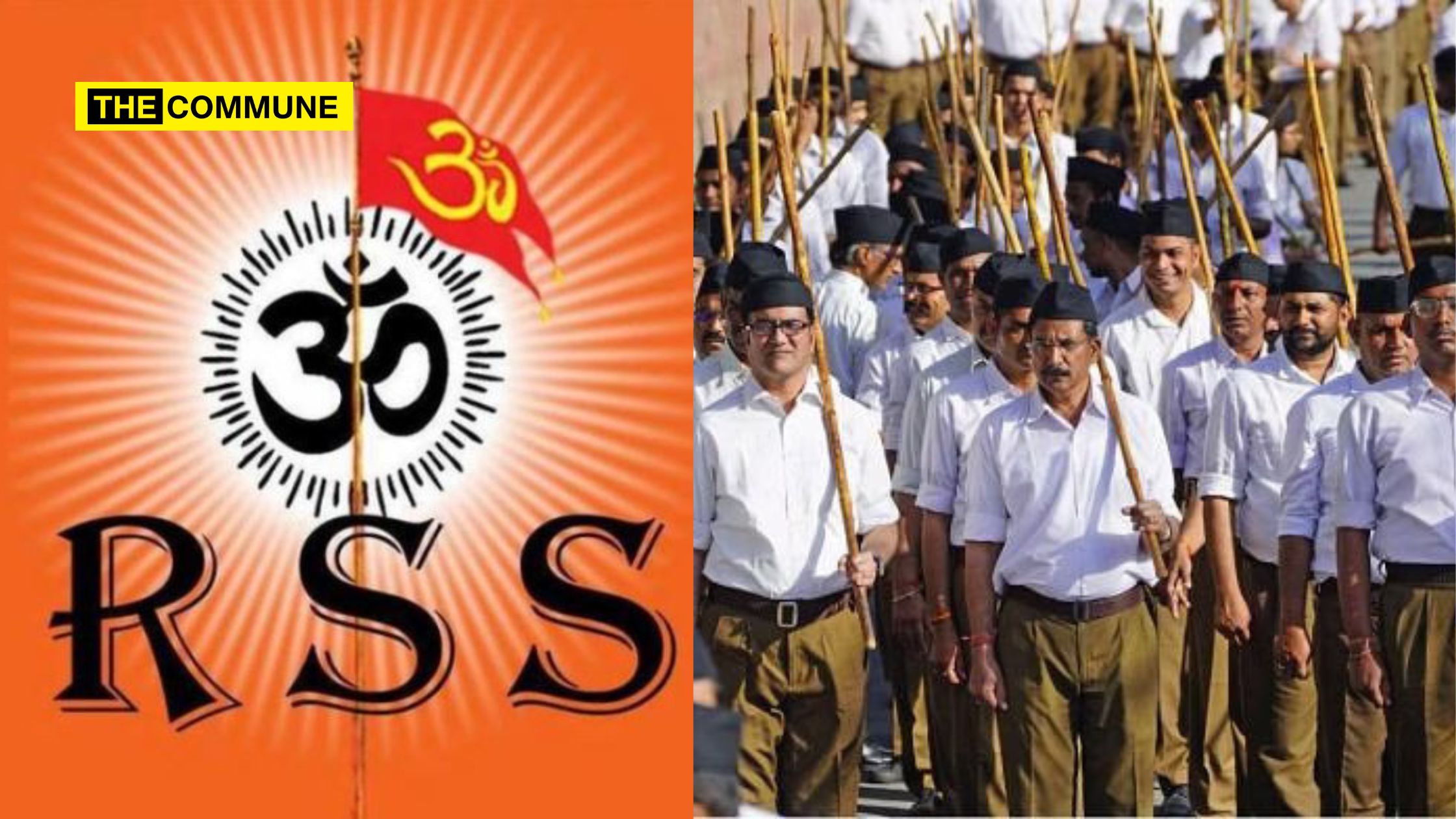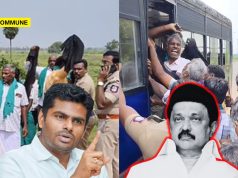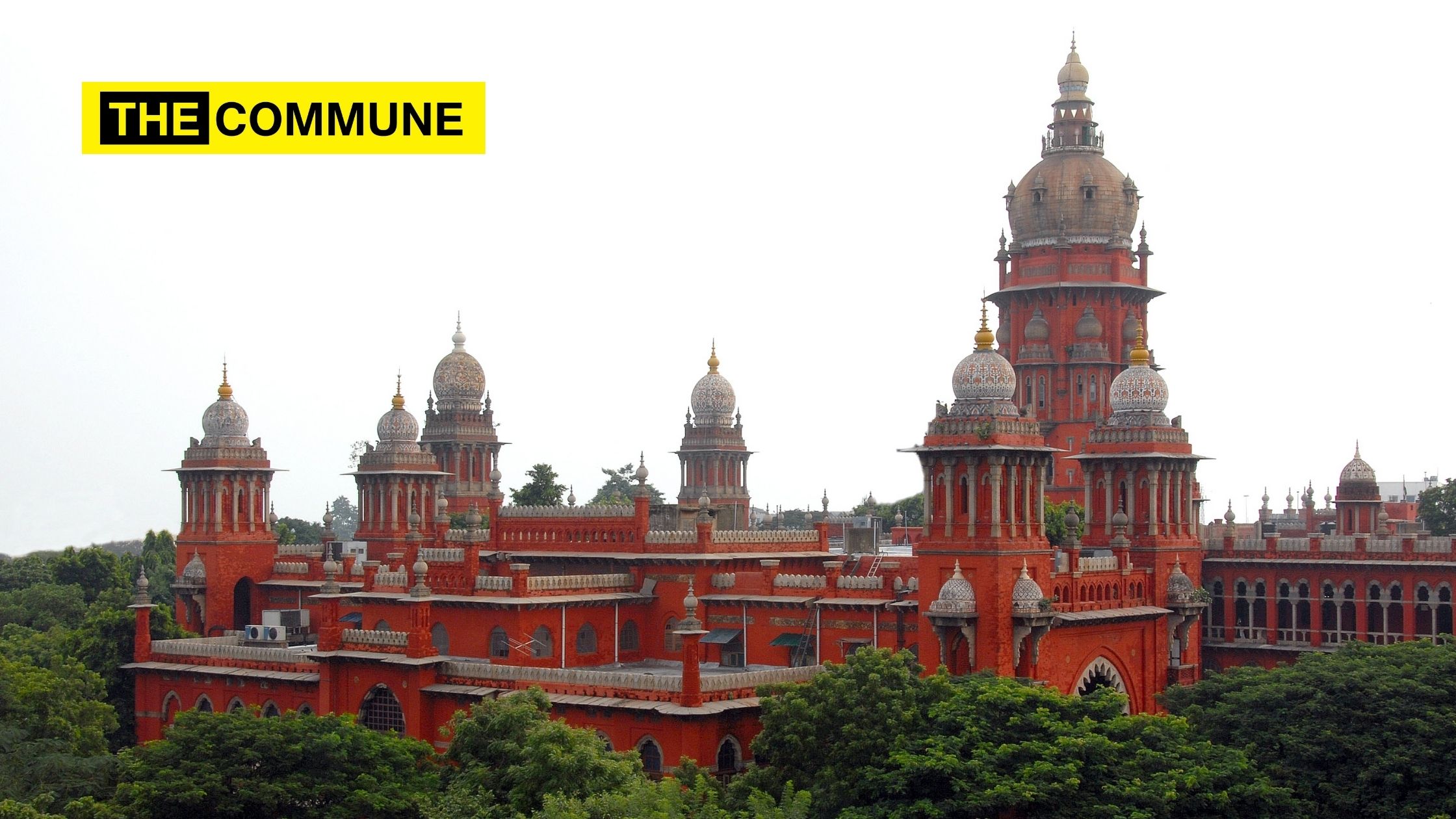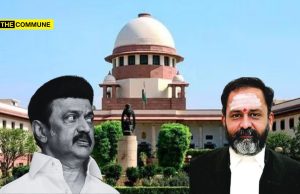
In Tamil Nadu, Dravidianists often discredit the Rashtriya Swayamsevak Sangh (RSS) using Joseph Goebbels’ propaganda technique: “Repeat a lie often enough, and it becomes the truth.” However, these efforts consistently fall flat, as their baseless distortions of historical facts and inaccuracies have been debunked numerous times.
For example, just after the 78th Indian Independence Day, Dravidianists launched accusations against the RSS, claiming it was opposed to Indian independence; it was against the national flag. They claimed it opposed the constitution, labelling it as a fake nationalist organization.
These claims are based on distorted historical interpretations reminiscent of Goebbels’ Marxist historiography. They falsely attribute a range of actions and statements to the RSS, including the below allegations:
- Hedgewar declared that the RSS would not join the Salt Satyagraha in 1930.
- The RSS urged its followers to join the British Imperial Civil Guard in December 1940.
- Hedgewar announced that the RSS would avoid the Quit India Movement in August 1942.
- That RSS’s publication, Organiser, ‘denigrated‘ the national flag and asserted that Hindus would never respect or own it.
- Nathuram Godse, an RSS member, assassinated Gandhi on 30 January 1948.
- The RSS was banned across India in February 1948
- The RSS objected to the Indian Constitution on 30 November 1949
- RSS opposed the Hindu Code Bill
In this article, we will debunk these historical lies with accurate context and let the truth slap these distorted narratives.
Hedgewar Declared RSS Would Not Join Salt Satyagraha 1930
To understand Keshav Baliram Hedgewar’s role in the Indian independence struggle, it’s important to recognize his alignment with a more radical view, similar to Lokmanya Bal Gangadhar Tilak.
Unlike the moderates who petitioned the British for concessions, Like Bal-Pal-Lal, Hedgewar advocated for more direct and confrontational methods. From 1885, when the Indian National Congress was founded, until 1907, moderate petitioners dominated the political landscape, resisting radical change. However, from 1905 to 1920, opposition to British policies and Western values intensified, leading to draconian measures to suppress revolutionary activities. As Gandhi and Nehru’s influence grew, the British found the moderate approach more manageable, as it had not challenged their rule significantly since 1915.
Hedgewar charted his course in the independence movement. Expelled from school in 1908 for chanting “Vande Mataram,” he was influenced by S. Malik, a principal at the National Medical College who combined Western education with a strong commitment to cultural roots. Hedgewar joined the Congress Party and was inspired by Lokmanya Tilak in Nagpur, where he became involved with the Rashtriya Mandal. In 1921, he was imprisoned for sedition due to his speeches in Katol and Bharatwada, and as a member of the Anusheelan Samiti, he supplied arms and literature to revolutionaries.
Hedgewar came under British surveillance in August 1908, and this scrutiny continued after he founded the RSS in 1925. By 1926, the RSS shakhas were established in Nagpur and Wardha. During this period, a plan was initiated to return revolutionary colleagues from Central Provinces stranded in Punjab. This operation, led by Hedgewar’s associates Dattatraya Deshmukh, Abhad, and Motiram Shravane, was executed with Ganga Prasad Pande in charge. After Pande fell ill in Wardha in 1927, a pistol he had for protection was seized by a friend. In 1928, a failed attempt to raid a government treasure chest in Hinganghat involved this pistol, which was traced back to Pande. To avoid detection, Hedgewar and his associate Hari Krishna Joshi intervened to retrieve the pistol and escape.
Following these events, Hedgewar and Joshi were subjected to intense surveillance, extending to their activities in the RSS shakhas. In early 1930, the Deputy Superintendent of Police interrogated Joshi, questioning his commitment to non-violence due to his association with Hedgewar and the RSS. Joshi’s response eased the surveillance, but it was crucial for Hedgewar to demonstrate a shift away from revolutionary activities.
In February 1930, Joshi informed Hedgewar of his decision to join the satyagraha, to which Hedgewar initially responded with caution. After further discussions and the conclusion of the Sangh’s Officer Training Camp, Hedgewar agreed to participate in the satyagraha, marking a significant step in his political engagement (Sangh archives, Hedgewar papers)
RSS Urged Followers To Join British Imperial Civil Guard In 1940
History often becomes distorted when contemporary ideological biases shape interpretations of the past. The narratives put forth by Marxist and Nehruvian historians regarding the Rashtriya Swayamsevak Sangh (RSS) do not align with the factual record.
According to the Home Department’s 1939-40 report, the RSS had an estimated strength of around 150,000 members across various age groups nationwide. During World War II, the British government launched recruitment drives for the army, ARP, and Civic Guards. Hindu organizations, including the Hindu Mahasabha and Nathuram Godse’s Hindu Rashtra Sena, seized this opportunity to militarize their cadres for a potential struggle against the British. They actively organized camps and recruited members.
In contrast, the RSS firmly rejected this approach, a stance that did not go unnoticed by the British authorities. In June 1939, the Home Department suggested that the Central Provinces government use Section 16 of the Criminal Law Amendment Act (XIV of 1908) to ban the RSS, which was then a prominent organization in the province.
However, Chief Secretary GM Trivedi reported on 22 May 1940, that such a move would likely lead to significant unrest. During the 1930s, even attempts to use softer measures against the RSS resulted in government embarrassment. The RSS’s participation in the Civil Disobedience Movement countered the perception that it was merely an extension of the Hindu Mahasabha. The CP & Berar police’s reports noted that Hedgewar’s involvement energized the movement, leading to his imprisonment for a year.
Hedgewar Announces RSS Would Avoid Quit India Movement In 1942
On 5 August 1940, the central government, under the Defence of India Rules, issued an ordinance banning drills, uniforms, and exercises. However, this did little to deter the RSS, as hundreds of volunteers were arrested for defying the order. The RSS’s involvement in the Quit India movement was a significant concern for the British authorities. In August 1942, RSS members led Congress processions and attacked police stations in Chimur and Ashti, resulting in severe government reprisals. The RSS’s integration with the movement alarmed the British, who feared a potential armed coup in collaboration with the Indian National Army (INA).
The British had valid reasons for their concerns. Reports indicated that RSS volunteers had infiltrated various government departments, raising fears of a coordinated effort to capture administrative centers when the time was right. The Home Department’s note from GA Ahmed on 13 December 1943, revealed a strategic intent to prohibit all organizational camps to undermine the RSS, which relied heavily on these camps for training.
Despite participating in Gandhian movements, the RSS maintained its revolutionary zeal and ambition to overthrow colonial rule. The RSS’s real shortcoming is not its lack of involvement in the freedom struggle but the limited intellectual engagement among its scholars.
Organiser Denigrated National Flag
In December 1929, during the Lahore Session of the Indian National Congress, the goal of Purna Swaraj, or Complete Independence, was adopted, and on 26 January 1930, was designated as Purna Swaraj Day.
Before this, the Congress had aimed for Dominion Status. Keshav Baliram Hedgewar, a staunch advocate for complete independence, was thrilled by this development. On 21 January 1930, he issued a directive to all RSS shakhas, instructing them to hold meetings on 26 January to salute the national flag, the Bhagwa, and to explain the concept of freedom to the swayamsevaks. He emphasized the importance of keeping the goal of independence in mind. He concluded the directive by congratulating the Congress for its commitment to achieving independence (Sangh archives, Hedgewar papers, A Patrak by Dr. Hedgewar to the swayamsevak – 21 Jan 1930).
“On 26 January 1930, all shakhas of the Rashtriya Swayamsevak Sangh should hold meetings of all swayamsevaks of their respective shakhas at their respective Sanghasthans and salute the national flag that is the Bhagwa, explain through lectures what is freedom and how it is the duty of every Indian to keep this objective before oneself and conclude the programme by congratulating the Congress for championing the goal of Independence” – Hedgewar
RSS Member Nathuram Godse Assassinated Gandhi
Although Nathuram Godse was responsible for the assassination of Mahatma Gandhi on 30 January 1948, the RSS itself had no involvement in the crime. Godse shot Gandhi three times at close range. Despite repetitive claims to the contrary that would make Goebbels proud, there is no evidence linking the RSS as an organization to the assassination.
Goebbels famously said, ‘Propaganda works best when those being manipulated are confident they are acting on their own free will.’ This is precisely the kind of manipulation used against the RSS to mislead public perception after Gandhi’s assassination.
RSS Was Banned Across India
Following the assassination of Mahatma Gandhi by Nathuram Godse, the Indian government imposed a ban on the Rashtriya Swayamsevak Sangh (RSS) on 4 February 1948. The government announced that this action was necessary to “eliminate the forces of hate and violence” in the country.
The official statement alleged that members of the RSS had engaged in violent acts such as arson, robbery, dacoity, and murder, and had amassed illegal arms and ammunition. They were accused of distributing leaflets promoting terrorist tactics, encouraging the collection of firearms, inciting disaffection against the government, and undermining the police and military.
The government explained that although individual members had been addressed previously, the continued “objectionable” activities and the violence linked to the RSS, culminating in the assassination of Gandhi, necessitated a ban. The government declared that, in response to the resurgence of violence, the RSS had to be designated as an unlawful association.
Challenging Goebbels’ propaganda techniques requires a steadfast commitment to truth, as seen in the efforts of swayamsewaks to correct the distorted portrayals of the Sangh Parivar.
The RSS contested the ban, with then-Sarsanghchalak MS Golwalkar meeting with Home Minister Sardar Vallabhbhai Patel and writing to both Patel and Prime Minister Jawaharlal Nehru. When these negotiations failed, swayamsevaks initiated a satyagraha on 9 December 1948, demanding the removal of the ban. The ban was lifted on 11 July 1949 via a government communiqué stating that the RSS leadership had no connections.
RSS Objected To the Indian Constitution
These quotes highlight the RSS’s dissatisfaction with the Indian Constitution and their preference for the Manusmriti, but their context cannot be independently verified.
Editorial from Organiser: The RSS’s publication, Organiser, published an editorial on 30 November 1949 critiquing the Indian Constitution, claiming that it was devoid of any Indian essence. The editorial argued that the Constitution ignored ancient Indian legal traditions and praised the Manusmriti, stating that its laws had been admired globally for centuries. The article suggested that the Indian Constitution lacked the revered principles found in Manusmriti.
M.S. Golwalkar’s Critique: M.S. Golwalkar, the second sarsanghchalak of the RSS, echoed similar sentiments in his book Bunch of Thoughts. He argued that the Indian Constitution contained no original Indian elements and was a mere amalgamation of principles from the United Nations Charter and Western Constitutions. Golwalkar highlighted the statue of Manu in Siam (modern-day Thailand) as a symbol of respect for ancient Indian legal traditions, contrasting it with what he perceived as the Constitution’s lack of Indian roots.
V.D. Savarkar’s Perspective: V.D. Savarkar, a prominent figure in the Hindu Mahasabha and a philosopher for the RSS, also advocated for the Manusmriti to replace the Indian Constitution. He believed that the Manusmriti should form the basis of India’s legal and cultural framework. Savarkar’s perspective reflects a broader critique that the Indian Constitution was too heavily influenced by foreign models rather than embracing India’s unique cultural heritage.
Opposing Hindu Code Bill
RSS opposed the Hindu Code Bill, and for the right reason. They opposed it primarily because of its secular approach, which they felt was inconsistent with their view of Hindu traditions. They argued that the bill aimed to impose uniform civil laws on Hindus, thereby undermining the diverse and traditional personal laws within the Hindu community.
Sangh supporters were concerned that the bill’s secular intent was a disguised attempt to promote secularism at the expense of Hindu values and customs.
They also viewed the bill as a move by the government to secularize Hindu personal laws while avoiding similar reforms for other religions, such as Islam and Christianity.
In Conclusion
The persistent use of Goebbels’ propaganda techniques by Dravidianists to discredit the RSS reflects a deliberate attempt to rewrite history and distort the truth.
Despite the best efforts of Goebbels’ followers, factual records consistently prove that RSS is a nationalist organisation rooted in Bharatiya values. By revisiting historical events with accurate context, it becomes evident that these allegations are fabricated narratives designed by Dravidianists to manipulate public perception against the social organisation.
Just as Goebbels believed that repeating a lie would eventually make it accepted as truth, these false narratives have been perpetuated with the hope of erasing the RSS’s contributions to India’s independence. However, the truth is clear: the RSS’s role in preserving India’s cultural and national identity is undeniable. Be it Goebbels or any other Marxist, no propaganda creator can erase the RSS’s legacy of patriotism, commitment, and sacrifice for the nation.
What many of these Draviadianst stock conveniently forget to read is that Goebbels also said that ‘the truth is the greatest enemy of the State.” In his own words, ultimately, the truth prevails and it will expose the hollowness of any length of Goebbels-ian distortions.
Subscribe to our Telegram, WhatsApp, and Instagram channels and get the best stories of the day delivered to you personally.




